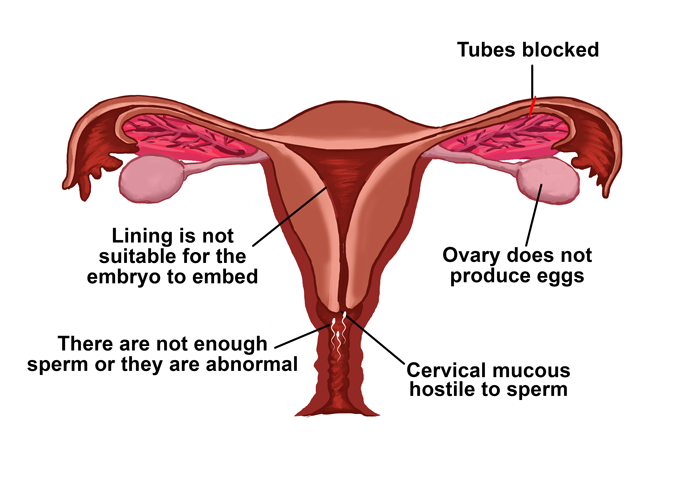Most people assume they are fertile and will become pregnant as soon as they start trying.
For most couples a pregnancy is achieved within the first year of having regular sexual intercourse around the time of ovulation. However it may take longer, with age and life-style factors (such as stress, smoking, alcohol intake, and over or underweight) making a difference in both women and men.
Possible causes of fertility problems for women:
- damage to the fallopian tubes (may be caused by past infection)
- problems with ovulation
- age, as female fertility declines sharply after the age of 35
- being overweight or underweight
- chronic illness (such as polycystic ovary syndrome, or endometriosis)
- gynaecological problems such as previous ectopic pregnancy or having had more than one miscarriage
- medical conditions such as diabetes, epilepsy, thyroid problems
- genetic factors (such as Turner Syndrome)
- undergoing cancer treatment
- untreated STIs
Possible causes of fertility problems for men:
low sperm quantity or quality
problems getting an erection and ejaculation
having had inflamed testes
a past bacterial infection that caused scarring and blocked tubes within the epididymis
having received medical treatment such as drug treatment, radiotherapy or surgery
genetic problems
diabetes
lifestyle factors such as being overweight or having a job that involves contact with chemicals or radiation

If you have been trying to get pregnant for 12 months, or six months if you're 35 or over, and have been unsuccessful, you and your partner should seek medical advice.
Many infertile people can still become parents. Some find out the reason for their infertility and have it treated. Others may benefit from reproductive technologies or they may choose donors, adoption or foster parenting.
If you are planning a pregnancy it is a good idea to visit a doctor for a preconception consultation. At this consultation you be provided with advice and information so you can be prepared and provide the best care for you and the pregnancy.
The preconception period (three months prior to pregnancy) is the time to make life changes that can help fertility, provide the best nutrition for developing eggs and sperm, reduce problems during pregnancy and assist in recovery after the birth.
Of course many pregnancies are not planned so there may not be the opportunity to seek preconception advice. However many of these life changes will be benefit you and your baby’s health at any stage during the pregnancy.